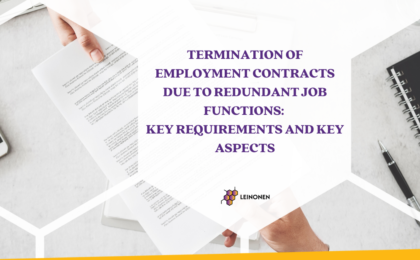Reminder to the employers: do you meet the requirements of the new Labour Code?
1. Without regard to number of employees working in the company:
– in all companies where the workplace is monitored (i.e. video surveillance, checking of employee’s electronic correspondence, etc.), the use of information and communication technologies and workplace monitoring and control in the workplace methods should be developed, enabling employees to be clearly aware of the purposes of monitoring and when they can be monitored;
– non-competition agreements and confidentiality agreements must be reviewed and adapted to the new Labour Code, since such agreements are now included in the field of labour law relations, the essential terms and conditions of such agreements, maximum terms, employer’s obligations, amounts of compensation, etc. are being established;
– the full material liability agreements concluded before the entry into force of the new Labour Code are no longer valid;
– the number of days of annual leave belonging to employees must be recalculated, since according to the new Labour Code, annual leave shall be calculated at working, not on calendar days.
2. If there are 20-49 employees working in the company, it is additionally required:
– to form the Labor Council, in particular by setting up the Labor Council Election Commission, which organizes the election of the Labor Council. The employer’s duty is to ensure the election of the Labor Council, inform and consult the Labor Council in accordance with the laws and provide necessary information;
– to prepare and approve Work Payment System, which establishes the forms of remuneration, system of additional payment, minimum and maximum salaries in accordance with the categories of employees positions and their qualifications. The purpose of this system is to ensure equal pay for the same qualification employees doing the same work, depending on objective criteria;
– to implement the obligations set out in Paragraph 1.
3. If there are 50 employees and more working in the company, it is also required:
– to embrace and publish in the usual way in the company measures to implement the principles of the implementation and enforcement of equal opportunities policies. The policy of employees equal rights is imposed to define and anticipate what measures the employer will take to ensure that the principle of non-discrimination is implemented;
– to embrace and publish in the usual way in the company personal data of the employees protection policy and its implementing measures. The purpose of this document is to provide all employees with clear and understandable rules on the use and protection of personal data and to ensure that these rules are respected by the employees themselves;
– to implement the obligations set out in Paragraph 1 and Paragraph 2.
Please note that the provisions of the latest Labour Code have already entered into force, and therefore the above requirements must be implemented immediately. Please remark that for failure to comply with the obligations, a fine of EUR 80 to EUR 880 can be imposed on the company’s director, with the requirement to prepare the necessary documentation and perform other related actions.
Leinonen lawyers can help your company to prepare the above-mentioned documents, review and evaluate the compliance of the content of the employment contracts of the employees with the requirements of the Labour Code and implement the necessary changes.




